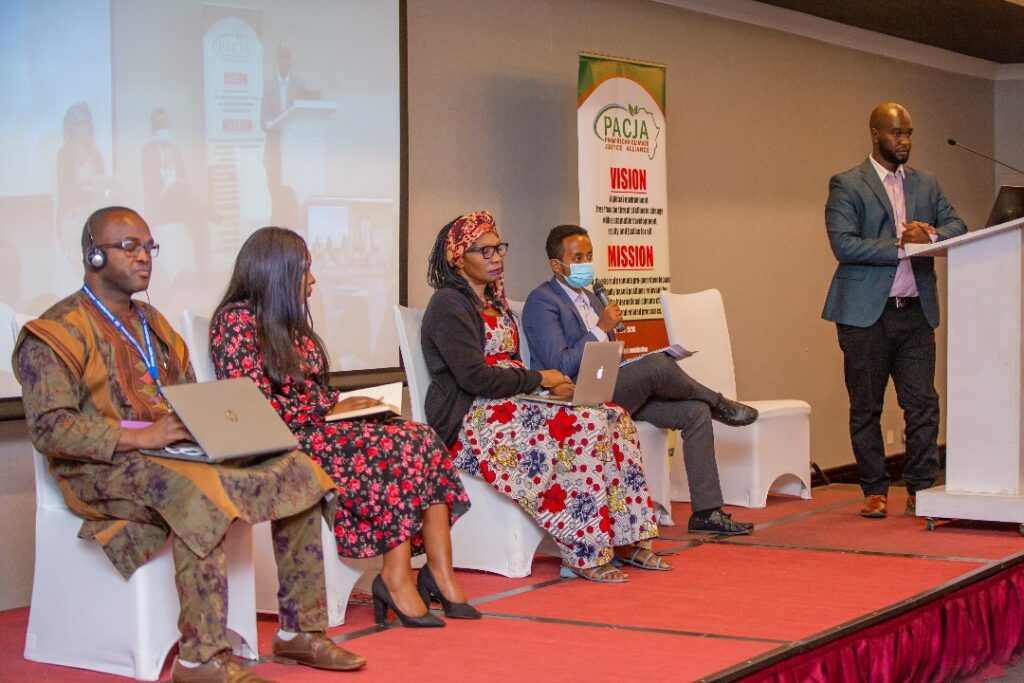
Campaigners coalescing under the Pan African Climate Justice Alliance (PACJA) have identified increased migration, displacement, inter/intra-national political tensions, as well as the risk of violent conflicts as problems facing Africa due to climate change. This was made known in Kigali, Rwanda during the Africa Regional Dialogue on Climate Security.
Speaking on the sidelines of the eighth African Regional Forum on Sustainable Development, Dr Mithika Mwenda, the Executive Director of PACJA noted that climate change has exasperated conflicts leaving the youth, women, and elderly to bear the brunt of these conflicts and displacements.
He said examples in Zimbabwe, Mozambique and Malawi have shown that when climate change is unchecked, humans suffer; they lose livelihood, or get displaced or turn to the neighbours they consider as competitors to their reducing resources.
Mwenda urged governments to tackle climate change quickly or risk rising instability due to climate-related conflicts and migration.
According to Dr. Nicholas Orago, Senior Lecturer, University of Nairobi’s School of Law, all regions of Africa are experiencing one form of climate-related displacement, migration or conflict due to flooding, droughts or dwindling resources.
He noted that climate-related security risks increase conflict prevention and resolution challenges.
Dr Orago said due to the resource-based nature of our economies and livelihoods, their degradation by climate change leads to resource scarcity, generating competition for available resources and creating tensions that break out into conflicts due to contestation on access, use and ownership of natural resources.
According to the World Bank, over 200 million people are likely to migrate or be displaced within their own countries due to climate change.
“The worst part of this is that 50 per cent of the losses people suffer due to climate change go unaccounted for, and neither victims nor survivors ever get compensated,” said Dr Orago.
Lere Shaba, World Green Building Council said, “when people leave climate-affected areas into other, new promising areas, this often leads to competition and tension with host communities, further compounding conflicts, particularly in Africa with its ethnic polarisation.”
The latest Intergovernmental Panel on Climate Change (IPCC) report shows that countries experiencing challenges with governance issues are more vulnerable to climate-triggered conflicts. While firm opinion is still shaping the nexus between climate change and conflicts; there is a shared consensus that Climate change is a conflict risk multiplier.
The report noted that climate change might trigger or aggravate conflicts through the sudden- and slow-onset events as they threaten livelihoods.

Dr Orago noted that a 0.5°C increase in local temperatures increases risk of armed conflict by 10-20 per cent, adding that the links between climate change, migration and conflict are heavily dependent on local conditions. A case in point is what is happening in the Sahel region, the horn of Africa and parts of Southern Africa.
According to Mamadou Oudrago, PACJA Burkina Faso platform, the Sahel region has been experiencing rising cases of climate-related conflict in recent years. He said:
“For example, scarcity of water and pasture often leads to competition and conflict either between pastoralists themselves, pastoralists and farmers, or pastoralists and conservationists. While certain conflicts may not be directly related to climate change, for communities who depend only on meagre weather-dependent natural resources, conflicts often arise.”
“Now for the Sahel communities, most are now turning to their young people who they perceive as defenders of community interest. The Sahel region is seeing more youth becoming more radicalised. In Nigeria, Togo, Mali, Burkina Faso, there are rising conflicts between pastoralists and farmers. The same situation obtains in Gabon, Cameroon, Central Africa Republic, Ethiopia, Kenya among others,” Mamadou added.











